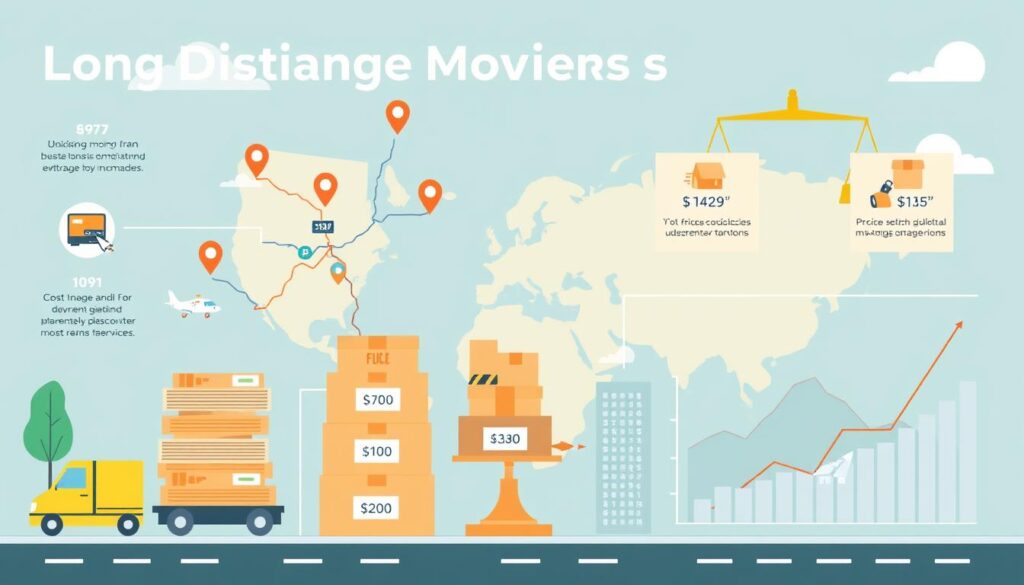How much do long distance movers cost?
Get Your Free Moving Estimate
Understanding how much long distance movers cost is crucial for effective planning as you embark on your moving journey. At HeavenlyMove, with over 20 years of experience and more than 35,000 successful moves under our belt, we take pride in offering transparent long distance movers pricing without hidden fees. Our impressive 4.9-star Google rating reflects our commitment to customer satisfaction, ensuring you receive exceptional value for your investment. By educating you on the various factors that influence moving costs, such as distance, type of service, and additional fees, we help demystify the process of finding affordable long distance moving services.
Key Takeaways
- Long distance mover costs vary based on several factors.
- Transparent pricing without hidden fees is essential for budget planning.
- Experience and customer satisfaction ratings can guide your choice of movers.
- Understanding moving costs helps in making informed decisions.
- Affordable long distance moving services are available with the right research.
Understanding Long Distance Moving Costs
When planning a long-distance move, understanding the various factors influencing the cost is crucial. We consider aspects such as mileage, home size, and timing, all of which can significantly impact the overall cost of moving across the country. By understanding these elements, we can make more informed choices and budget effectively.
Factors Influencing Cost
Numerous factors contribute to long distance movers pricing. Key considerations include:
- Mileage: The distance between your current location and your new home primarily dictates costs. Longer distances typically mean higher prices.
- Home Size: The volume of belongings affects the average cost of long distance movers. Larger homes require more time and resources to move.
- Additional Services: Services such as packing, unpacking, and storage can increase the overall expense.
- Accessibility: If moving to a location with limited access, extra fees may apply.
Average Costs by Distance
It’s helpful to have a clear idea of the average costs associated with moving based on distance. Below is a table delineating estimated moving expenses:
| Distance (Miles) | Average Cost ($) |
|---|---|
| 100-300 | 1,000 – 2,500 |
| 300-600 | 2,500 – 5,000 |
| 600-1,000 | 5,000 – 7,500 |
| 1,000+ | 7,500+ |
Seasonal Pricing Variations
Moving expenses can fluctuate throughout the year. Peak moving seasons typically occur during summer months and weekends, leading to higher costs. Planning your move during off-peak times might help in reducing the cost of moving across the country. Discounts may also be available during these periods, ensuring more affordable long distance movers pricing.
Types of Long Distance Moving Services
When planning a long-distance move, it is essential to understand the different types of services available. Each option caters to diverse needs and budgets, allowing individuals and families to choose the best fit for their relocation.
Full-Service Moves
Full-service moving options offer an all-inclusive experience. These services typically cover packing, loading, transportation, and unloading of your belongings. For those looking for a hassle-free process, full-service moves can provide peace of mind. Long distance movers pricing for this type of service might appear higher, but the convenience and reduced stress can be worth the investment. It’s important to obtain multiple moving company quotes to compare costs and services effectively.
Self-Service Moves
Self-service moves create a balance between cost and control. In this model, the moving company provides the truck for transportation, while you handle the packing and loading yourself. This approach allows for a more economical option without sacrificing assistance during the move. Carefully assess long distance movers pricing in this category, as it may vary based on distance and services included. Gathering moving company quotes helps in making an informed decision.
DIY Moving Options
For the most budget-conscious individuals, DIY moving options present the highest level of control, along with significant savings. This approach requires more effort, including sourcing packing materials, managing logistics, and driving the moving truck. Those who choose the DIY path should ensure they have the time and organization required for a successful relocation. Researching long distance movers pricing for equipment rentals further aids in budgeting for a DIY move.
Average Cost Estimates for Long Distance Moves
Estimating costs for long-distance moves can seem daunting at first. By breaking down costs based on mileage and home size, we can offer clarity while utilizing a moving expenses calculator to provide you with realistic estimates. Understanding these aspects will help in anticipating the budget for your upcoming move.
Cost Per Mile Calculations
The cost per mile for a long-distance move varies significantly depending on various factors. A simple calculation can help provide insights into your potential expenses:
- Average Cost per Mile: Typically ranges from $0.50 to $2.00.
- Additional Costs: Factor in fuel, tolls, and any other related expenses.
- Base Rate: Moving companies may set a minimum fee along with the per-mile rate.
Average Costs for Various Home Sizes
The size of your home plays a significant role in determining the total moving cost. Here’s an overview based on common home sizes:
| Home Size | Estimated Cost |
|---|---|
| One-Bedroom Apartment | $1,000 – $3,000 |
| Two-Bedroom Apartment | $2,000 – $5,000 |
| Three-Bedroom House | $3,000 – $7,000 |
| Family Home (4+ Bedrooms) | $4,000 – $10,000+ |
Utilizing a cross country moving estimate allows you to budget more effectively. Knowing the average costs based on home size helps in making informed decisions.
Hidden Fees in Long Distance Moving
Understanding the true cost of moving across the country requires careful consideration of all potential charges. Hidden fees can unexpectedly elevate your moving expenses, leading to budget surprises. We will explore some of these common additional costs that can affect your overall expenditure.
Fuel Surcharges
Fuel surcharges are one of the most prevalent hidden fees in long distance moving. These charges are often added to the quoted price, reflecting fluctuations in fuel costs. As gas prices rise, movers may adjust their fees, impacting the overall cost of moving across the country. Always inquire about these surcharges when obtaining quotes.
Packing and Unpacking Fees
Opting for professional packing and unpacking services can streamline your move, but it often comes with hidden fees. Movers typically charge extra for packing materials and labor. Knowing in advance what these fees entail can help avoid unexpected expenses on your final bill.
Storage Fees
In circumstances where a move requires temporary storage, additional fees may apply. Many moving companies charge for storage space, and these hidden fees can quickly accumulate. It is crucial to discuss potential storage needs with your mover to achieve greater clarity on the total cost of moving across the country.

Obtaining Moving Quotes
Understanding the process of obtaining accurate moving company quotes is crucial for a successful move. It ensures you are well-informed about potential costs and helps avoid unexpected charges. We advocate for pursuing written estimates, as these provide a clear breakdown of expenses and create a reliable record for reference.
Written Estimates vs. Verbal Quotes
There are distinct differences between written estimates and verbal quotes. Relying solely on verbal quotes can lead to ambiguity, increasing the risk of miscommunication regarding services and costs. Written estimates outline the entire range of services provided, which helps set realistic expectations and provides a documented basis for comparison.
- Written Estimates: Ensure clarity and consistency in pricing.
- Verbal Quotes: May lack detail, leading to confusion or hidden costs.
Importance of In-Home Assessments
To provide the most accurate moving company quotes, in-home assessments are essential. During this evaluation, our team can assess your belongings and determine necessary services tailored to your specific needs. This personal touch ensures that all factors affecting your moving costs are considered, creating a comprehensive overview of potential expenses.
The table below summarizes the benefits of in-home assessments compared to generic quotes:
| Aspect | In-Home Assessment | Generic Quote |
|---|---|---|
| Personalization | High – tailored to specific needs | Low – one-size-fits-all |
| Accuracy | High – detailed evaluation of items | Medium – estimated based on averages |
| Written Documentation | Provided | May not be available |
Budgeting for Your Move
Effective budget planning for moving ensures a smoother transition. Developing a solid moving budget allows us to allocate funds for different aspects such as packing supplies, transportation, and additional services. This structured approach minimizes financial surprises and enhances overall preparedness.
Creating a Moving Budget
To establish a comprehensive moving budget, start by listing all potential expenses. Consider the following categories:
- Transportation costs
- Packing materials
- Moving services
- Insurance options
- Utility deposits and disconnect fees
By estimating these costs, we can create a realistic financial plan that accounts for every detail of the move. It’s essential to set aside an emergency fund for unexpected expenses, which frequently arise during relocations.
Tips for Cutting Costs
Implementing savvy tips for cutting costs can yield significant savings. Some practical strategies include:
- Decluttering belongings to reduce the overall volume
- Asking friends or family for assistance with packing
- Shopping for packing supplies at discount stores
- Scheduling the move during off-peak times
Flexibility with moving dates can lead to lower rates, especially when avoiding the busy summer season. By incorporating these tips, we enhance our budget planning for moving and increase the likelihood of a successful and cost-effective relocation.
Insurance Options for Long Distance Moves
Choosing the right moving insurance is essential for protecting your belongings during a long-distance move. Various types of moving insurance options cater to different needs, ensuring that your possessions remain safeguarded throughout the transition. Understanding these options can greatly influence your overall satisfaction with the moving process.
Types of Moving Insurance
We offer several types of moving insurance for our clients, including:
- Basic Coverage: Covers a limited portion of loss or damage based on weight.
- Full-Value Protection: Provides comprehensive coverage for items, ensuring full repair or replacement costs.
- Additional Coverage Options: Various policies available for valuable or unique items like antiques and art.
Understanding Coverage Costs
Moving insurance coverage costs can vary significantly based on the type of policy chosen. Factors that influence these costs include:
| Insurance Type | Average Cost | Coverage Level |
|---|---|---|
| Basic Coverage | $0.60 per pound | Limited |
| Full-Value Protection | 1% of total move cost | Comprehensive |
| Additional Coverage | Varies by item | Specialized |
By collaborating with us, clients can expect personalized advice on selecting the most suitable moving insurance to fit their specific needs and budget. We prioritize our clients’ peace of mind, helping them navigate coverage costs while ensuring their belongings remain protected.
Long Distance Movers Pricing Models
When preparing for a long-distance move, understanding the right pricing models for movers becomes essential. We can assist you in deciphering the most suitable approach that caters to your specific needs, be it flexible hourly rates or a more structured flat-rate option.
Hourly Rates vs. Flat Rates
Each pricing model has distinct advantages and considerations. Here is a breakdown of both:
| Pricing Model | Advantages | Disadvantages |
|---|---|---|
| Hourly Rates |
|
|
| Flat Rates |
|
|
How to Choose the Right Model for You
Evaluating which model fits your circumstances can aid in achieving a smooth moving experience. Consider factors such as:
- The size and complexity of your move.
- Your budget constraints and financial planning.
- Expected time commitment for packing, loading, and transport.
- Potential additional services like packing or storage that may affect overall pricing.
By analyzing these aspects and consulting with experienced movers, you can select the most effective pricing models for movers that align with your moving goals.

Negotiating with Movers
Negotiating moving costs can seem daunting, but it offers a valuable opportunity to secure better pricing and terms. By developing effective negotiation strategies, we can empower ourselves to approach movers with confidence. Remember, a friendly but firm attitude often yields the best results.
Tips for Effective Negotiation
- Do Your Research: Familiarize yourself with average costs in your area. Knowledge of market standards aids in realistic negotiations.
- Get Multiple Quotes: Solicit estimates from various moving companies to create a competitive environment.
- Be Ready to Negotiate: Prepare a list of services you want to negotiate, such as packing materials or flexible delivery dates.
- Establish a Budget: Know your budget limits and be clear about them during discussions.
- Ask About Discounts: Inquire about any available promotions or loyalty programs that could reduce your overall costs.
What to Avoid When Negotiating
- Avoid Unrealistic Demands: Be reasonable in your expectations to maintain goodwill.
- Neglecting Fine Print: Always read contracts thoroughly to understand terms before agreeing.
- Being Too Aggressive: While assertiveness is key, a confrontational style can backfire. Strive for a collaborative tone.
- Failing to Consider All Costs: Ensure you understand the complete service package and any hidden fees.
- Walking Away Too Quickly: If negotiations stall, sometimes a pause can lead to more favorable terms.
Long Distance Movers and Extra Services
When planning a long distance move, understanding the available extra moving services can significantly enhance your experience. Customizing your move with these services not only offers convenience but also lightens the load during a potentially stressful time.
Packing Services
Packing can be one of the most time-consuming aspects of moving. Utilizing professional packing services allows you to:
- Save time and effort, allowing you to focus on other move-related tasks.
- Ensure your belongings are securely packed, reducing the risk of damage during transport.
- Access specialized materials and techniques tailored for various item types.
With these extra moving services, we take the strain out of organizing and boxing your belongings, making the transition smoother.
Specialty Item Handling
Certain items require extra care and specific handling during a move. Specialty item handling focuses on:
- Delicate items, such as artwork or antiques, that need extra protection.
- Oversized belongings, including pianos or large furniture, requiring specialized equipment and expertise.
- Unique items that might not fit standard packing criteria, ensuring they arrive safely at your new location.
By opting for these extra moving services, we ensure that even your most prized possessions receive the attention they deserve.
Comparing Moving Companies
When it comes to selecting the best moving service for your needs, comparing moving companies plays a crucial role. A thorough investigation of reviews and ratings can offer valuable insights into a company’s reputation, guiding you in making informed choices.
Importance of Reviews and Ratings
Reviews and ratings act as essential indicators of a moving company’s reliability and quality of service. It’s beneficial to look for companies with a history of positive feedback. For example, HeavenlyMove frequently receives high satisfaction ratings from clients for their professionalism and efficiency. Researching customer experiences allows us to understand what to expect and helps us avoid potential pitfalls.
Questions to Ask Potential Movers
Before finalizing a moving company, it’s vital to ask specific questions that clarify expectations and ensure a smooth experience. Here are some questions we recommend:
- What services are included in the quote?
- Do you have a valid license and insurance?
- How do you handle unexpected fees?
- What is your policy on damages or lost items?
- Can you provide references from previous clients?
Armed with the right questions and a clear understanding of comparing moving companies, we can confidently select a moving partner that aligns with our expectations and needs.
| Company | Rating | Services Offered |
|---|---|---|
| HeavenlyMove | 4.9/5 | Full-service, packing, storage |
| QuickShift | 4.5/5 | Self-service, rental trucks |
| Movers Unite | 4.2/5 | Full-service, packing only |
The Value of Professional Movers
When considering the logistics of a long-distance move, the choice between professional movers and DIY moving often arises. While the DIY approach may initially seem cost-effective, the time savings offered by hiring professionals can significantly enhance your moving experience. Professional movers handle the entire process, including packing, loading, transporting, and unloading, allowing you to focus on settling into your new home rather than getting bogged down in labor-intensive tasks.
Time Savings vs. DIY
By opting for professional movers, you not only save hours, but you also minimize the physical strain that comes with lifting heavy items and navigating your belongings through tight spaces. This efficiency leaves you with more time to address other important aspects of your relocation, such as organizing utilities and setting up services at your new location. The seamless logistics managed by expert movers further streamline the transition, making the entire process more manageable.
Stress Reduction and Peace of Mind
One of the greatest advantages of hiring professional movers is the substantial reduction in stress. DIY moving often comes with unexpected hurdles—from vehicle troubles to packing disasters. In contrast, professional movers bring expertise and experience to the table, ensuring every detail is handled correctly. This level of support instills peace of mind, allowing you to embrace your new beginning rather than feeling overwhelmed by the moving process. Investing in quality moving services ensures that you can transition comfortably, demonstrating the clear value that professional movers provide over a DIY approach.


